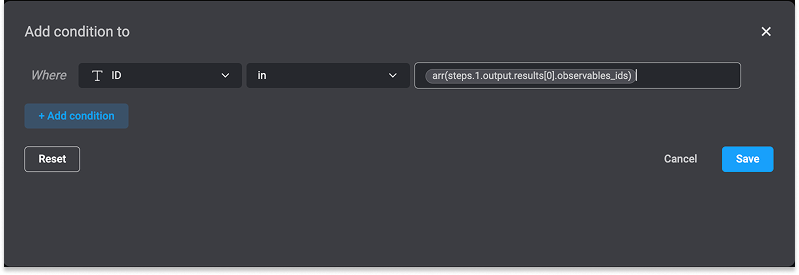Query a Case Management Table
Query a Case Management Table- Exception Rule
Query a Case Management Table- Exception Rule
When querying a case management table using a condition, and you are using both the 
in operator, it is essential to use the arr() function when working with arrays. Failing to do so will cause the workflow action to fail.For Example:
| Parameter | Description |
|---|---|
| Table Name | Type of Table: Alerts, Attachments, Cases, Custom Table, Observables, Tasks |
| Fields | Field Types |
| Condition (Optional) | Condition that compares two Case Management table field values. |
| Advanced-Limit (Optional) | Query Limit |

Query a Case Management Table using SQL
Query a Case Management Table using SQL by filling in the following parameters in the step.| Parameter | Description |
|---|---|
| SQL Query | The SQL Query |
| Output Format | Output Format Types: Table, CSV or JSON |
Please note that you need to use table and column names and not display names. Down below, is the full list of table and column names mapped to their display names.
SQL Query- Use Case Examples
SQL Query- Use Case Examples
To fetch related record objects (e.g., full rows like id, name) for each case:
To fetch only the related record IDs instead of full objects:For example, to fetch alert records with selected fields attached to each case, you can use the following SQL query:
To fetch only the alert IDs attached to each case, you can use the following SQL query
To fetch only the related record IDs instead of full objects:
Note: Replace
<inserted_table_name> with the actual table name that is associated with the cases.To fetch only the alert IDs attached to each case, you can use the following SQL query
List of Tables
Cases
| Name | Display Name |
|---|---|
| case_id | Case ID |
| type | Case Type |
| severity | Severity |
| name | Name |
| summary | Summary |
| created_at | Created At |
| case_manager | Case Manager |
| status | Status |
| linked_observables | Linked Observables |
| close_reason | Close Reason |
| closed_at | Closed At |
| closed_by | Closed By |
| closed_by_workflow | Closed By Workflow |
| collaborators | Collaborators |
| created_by | Created By |
| linked_alerts | Linked Alerts |
| linked_attachments | Linked Attachments |
| linked_cases | Linked Cases |
| linked_tasks | Linked Tasks |
| mitre_attack | Mitre Attack |
| response | Response |
| sla | SLA |
| sla_expiry | SLA Expiry |
| case_tags | Tags |
| created_at | Created At |
| vendors | Vendors |
Observables
| Name | Display Name |
|---|---|
| created_by | Created By |
| content | Content |
| enrichment_data | Enrichment Data |
| updated_at | Updated At |
| case_ids | Linked Cases |
| attachment_ids | Linked Attachments |
| task_ids | Linked Tasks |
| name | Name |
| type | Observable Type |
| description | Description |
| verdict | Verdict |
| alert_ids | Linked Alerts |
| id | ID |
| updated_by | Updated By |
| observable_id | Observable ID |
| auto_id | Observable Number |
| observable_ids | Linked Observables |
Alerts
| Name | Display Name |
|---|---|
| processed | Processed |
| id | ID |
| updated_at | Updated At |
| created_by | Created By |
| updated_by | Updated By |
| observable_ids | Linked Observables |
| template_exists | Template Exists |
| severity | Severity |
| response | Response |
| alert_id | Alert ID |
| case_ids | Linked Cases |
| type | Alert Type |
| name | Name |
| vendor | Vendor |
| event | Event |
| description | Description |
| attachment_ids | Linked Attachments |
Attachments
| Name | Display Name |
|---|---|
| updated_at | Updated At |
| created_by | Created By |
| updated_by | Updated By |
| id | ID |
| alert_ids | Linked Alerts |
| attachment | Attachment |
| attachment_id | Attachment ID |
| case_ids | Linked Cases |
| description | Description |
| name | Name |
| response | Response |
| task_ids | Linked Tasks |
| type | Attachment Type |
| menu | Menu |
| observable_ids | Linked Observables |
| created_at | Created At |
Tasks
| Name | Display Name |
|---|---|
| updated_at | Updated At |
| id | ID |
| created_by | Created By |
| updated_by | Updated By |
| created_at | Created At |
| observable_ids | Linked Observables |
| is_blocking | Block closing case until done |
| description | Description |
| closed_at | Closed At |
| case_ids | Linked Cases |
| task_id | Task ID |
| due_date | Due date |
| task_ids | Linked Tasks |
| name | Name |
| status | Status |
| alert_ids | Linked Alerts |
| priority | Priority |
Custom Tables
If you’re using custom tables, please follow the Query a Table Using SQL docs to fetch the correct table scheme. You can get the full table name via the Copy Table ID button:
